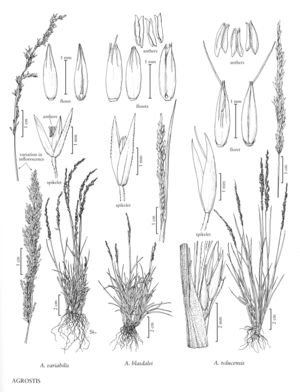Difference between revisions of "Agrostis tolucensis"
imported>Volume Importer |
imported>Volume Importer |
||
| Line 36: | Line 36: | ||
|publication year= | |publication year= | ||
|special status= | |special status= | ||
| − | |source xml=https://bitbucket.org/aafc-mbb/fna-data-curation/src/ | + | |source xml=https://bitbucket.org/aafc-mbb/fna-data-curation/src/200273ad09963decb8fc72550212de541d86569d/coarse_grained_fna_xml/V24/V24_926.xml |
|subfamily=Poaceae subfam. Pooideae | |subfamily=Poaceae subfam. Pooideae | ||
|tribe=Poaceae tribe Poeae | |tribe=Poaceae tribe Poeae | ||
Latest revision as of 16:26, 11 May 2021
Plants perennial; cespitose. Culms (3.3)5.5-60 cm, erect, glabrous, with (2)3-4 nodes. Leaves mostly basal or evenly distributed; sheaths glabrous, scabridulous; ligules 2-6.2 mm, membranous, scabridulous dorsally, apices acute to more or less truncate, erose to lacerate; blades 4-19 cm long, 0.5-4 mm wide, involute or flat, scabrous or smooth over the veins. Panicles 1.5-14 cm long, 0.5-1.5 cm wide, lanceoloid, somewhat spikelike, dense to somewhat open, exserted at anthesis; branches appressed, shorter than 2 cm; pedicels 0.7-3(4.5) mm, scabrous. Spikelets purple to green, shiny. Glumes subequal, 2-3.5 mm, 1-veined, keeled, keels and back usually smooth, occasionally scabrous, apices acute, muticous; lower glumes wider than the upper glumes; calluses with 2 tufts of hair to 0.3 mm; lemmas 1.4-1.9 mm, glabrous, 5-veined, veins evident, apices truncate to acute, microdenticulate, teeth to about 0.1 mm, dorsally awned from midlength or below, awns 2-3.5 mm, exserted, twisted, geniculate, scabridulous; paleas 0.1-0.2 mm, hyaline, linear; anthers 3, 0.5-1 mm. Caryopses 0.7-1.2 mm; endosperm soft. 2n = 28.
Discussion
Agrostis tolucensis grows in alpine meadows, usually in damp areas by lakes or streams. It is native from Mexico to Chile, Bolivia, and Argentina, growing in the Andes at 1800-4900 m. Its presence in the Flora region is dubious; two specimens in the S.M. Tracy herbarium, from Brewster and Brown counties in Texas, are listed in the Flora of Texas online database (http://www. csdl.tamu.edu/FLORA/tracy/mainl.html). Attempts to locate the specimens in 2005 were unsuccessful, suggesting the records may have been based upon misidentifications which have since been rectified.
Selected References
None.
